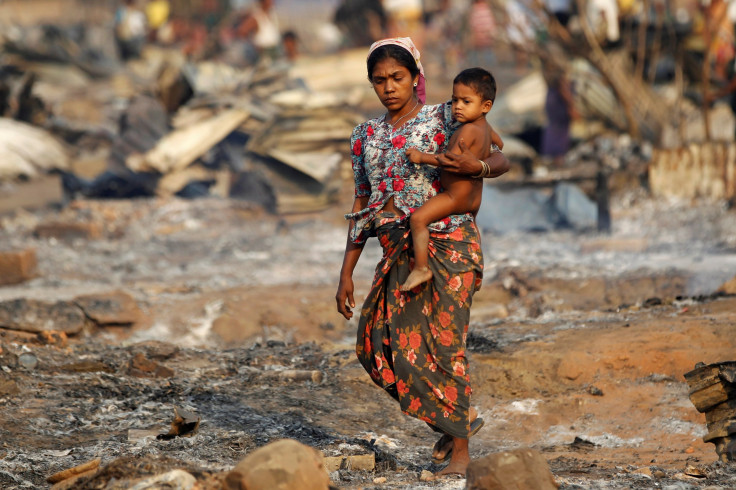Who Are The Rohingya? Myanmar's Long-Persecuted Muslim Minority Forced From Homes

Thousands of Rohingya villagers, who make up a large part of Myanmar’s greatly persecuted Muslim population, were forcibly removed from their homes by the national army this week. The action added to the bloody history between the ethnic minority group and the government.
The Myanmar government, led by Nobel Prize winner Aung San Suu Kyi, said the army and police were cracking down on a group of 400 Rohingya fighters in response to recent attacks on border security forces, the latest of which killed nine police officers on October 9, Al Jazeera reported.
But residents told Reuters by telephone that security forces had been killing non-combatants and burning homes.
Border guards went to Kyee Kan Pyin village Sunday, which is in the central region of Mandalay, and ordered about 2,000 villagers to evacuate it. Residents only had enough time to collect basic household necessities and valuables. They were then forced for a second night to stay and hide in rice fields without shelter.
“I was kicked out of my house yesterday afternoon, now I live in a paddy field outside of a my village with some 200 people including my family—I became homeless,” an unidentified Rohingya man told Reuters.
While the estimated 1 million Rohingya people may be the most persecuted people on the planet, Americans wouldn’t know it. They are subjugated by the Myanmar government to live in an area known as a red zone, meaning that foreign tourists are not permitted to enter it. Rather, the Myanmar government established a “tourist triangle” which mandated where tourists were allowed to go in order to protect itself from people witnessing or reporting the jarring human rights abuses suffered by the Rohingya people, many of which were reported to be still in practice today.
Though many Burmese people cheered when President Barack Obama announced that the United States would lift its economic sanctions on Myanmar last week in recognition of recent progress on human rights, activists have argued Suu Kyi has not done nearly enough to help the Rohingya who remained stripped of the rights that would be associated with having citizenship.
The Rohingya people were still required to receive a permit from the government in order to marry, and could not travel outside of the Rakhine State, according to Minority Rights Group International, an organization in over 60 countries working for rights for disadvantaged minorities.
The United Nations High Commissioner for Refugees estimated that more than 25,000 Rohingya people fled the country by human traffickers for greener pastures in countries like Thailand and Malaysia in 2015 alone.
© Copyright IBTimes 2025. All rights reserved.






















